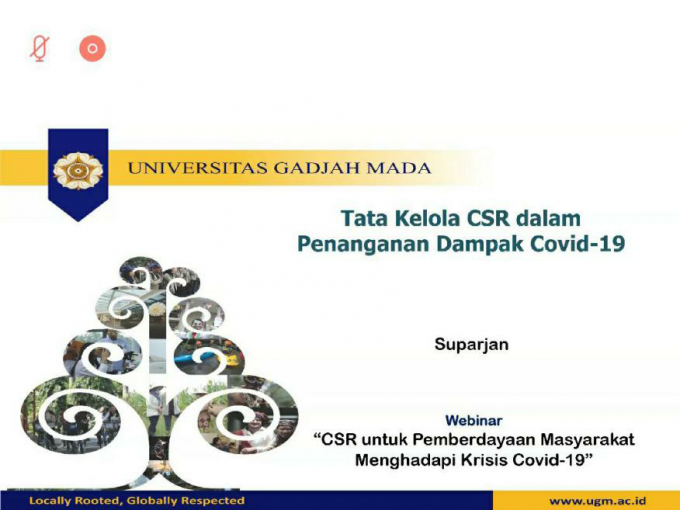
Yogyakarta, July 9th 2020—In its 63rd Dies Natalis, the Department of Social Development and Welfare held a webinar called ‘CSR for the Community Empowerment in Facing COVID-19 Crisis’. Even though they have held a webinar with the topic ‘CSR Role in the Crisis Management of COVID-19’, the Department of Social Development and Welfare offered novelty in this webinar. The topic in this webinar was focused to see the role of two actors—the company through its CSR and the community—collaboratively.
Moderated by Galih Prabaningrum, S.Sos., M.A., the lecturer of the Department of Social Development and Welfare, this webinar was held on the Webex platform. This webinar presented four speakers at once. The two speakers were represented the companies, they were Karyanto Wibowo as the Sustainable Development Director of Danone Indonesia, and Arya Dwi Paramita as the VP CSR & SME Partnership Program of PT Pertamina (Persero). The two other speakers, Prof. Dr. Sudharto P. Hadi, MES, Ph.D., as the Advisory Council of PROPER and the Professor of Environmental Sciences of Diponegoro University and Drs. Suparjan, M.Si., the lecturer of the Department of Social Development and Welfare, as the representatives of the academics.
The explanation of the topic was delivered when all of the speakers were presented on the Webex. Before that, the moderator explained about the rules in this webinar and the speakers sequence. It was started with the representative of the companies and continued with the academics representatives.
Both of the companies, Danone and PT Pertamina (Persero), they were not only providing an assistance in the form of donations as a quick response of COVID-19, but also cooperated with various micro, small, and medium enterprises (UMKM) and local communities as the mitigation of long-term effects. This cooperation was a form of empowerment so that both the UMKM and the local communities could rise and build the resilience after they affected by the COVID-19. Before cooperating, of course both of the companies mapped and identified the potential partners. This mapping was also done to separate which parties that should be the subjects or the objects in the provided assistance. The subjects were referred to the parties which could be independent and could help the others with their products or services.
One of the programs from both of the companies which was very relevant with this pandemic condition was the face masks production cooperation. Danone Indonesia empowered UMKM around the factory to produce face masks which would be distributed through the Sukabumi COVID-19 task force. Meanwhile, PT Pertamina (Persero) switched the garment industries to produce face masks and hazmat suits.
Other than the face masks production, both of the companies also did the other empowerment programs. For the example, PT Pertamina (Persero) cooperated with 176 fostered partner UMKM to help them in various ways. One of the fostered partners in the food sector was empowered to be a public kitchen. Meanwhile, Danone Indonesia cooperated with local communities to do labor intensive programs and WASH, cooperated with the UMKM to develop herbal and food products, and empowered the cleaning services.
The example of those empowerment programs as the CSR of the companies also added by Prof. Sudharto. Prof. Sudharto also emphasized that in the countermeasures of COVID-19 impacts, community based approach was the best. It meant that the community not only be seen as the recipient object of assistance, but also as the subject—same with the mapping that have been done by both of the companies. So far, the communities have showed themselves as the subjects by various initiating and self-managing in facing this COVID-19 pandemic. In this condition, the companies with their CSR could facilitate and increasing the scale from the initiation that have been done by the communities. Do not forget that the companies should also organize the CSR programs that suitable with the people’s needs in this pandemic.
Regarding why the collaborative approach is important to consider when handling COVID-19 was explained by the last speaker, Drs. Suparjan. He said that every actors have their own limit, in terms of knowledge, authority, and resources. Because of that, it needed reciprocal act from both of the CSR (corporate social responsibility) and ISR (individual social responsibility) as the form of collaboration. Basically, this ISR concept goes along with the communities initiation which explained by Prof. Sudharto.
A good collaborative management was the right step in disaster management—in this case, COVID-19 pandemic. In a good collaborative management, all of the actors became one. They had one goal, they divided the roles, and and took a joint decision. Suparjan also explained about what ways that could be taken by the companies in order to build a collaborative strategy CSR and ISR.
This webinar was ended by question and answer session in two sessions with six questions. “We agreed that COVID-19 affected the people in many sectors. We also agreed that the community empowerment in order to improve the welfare must be synergized with various actors, it can not be done with just one actor,” the moderator said in the end of the webinar. The webinar officially ended at 11.45 a.m. with a pantun from the MC.
